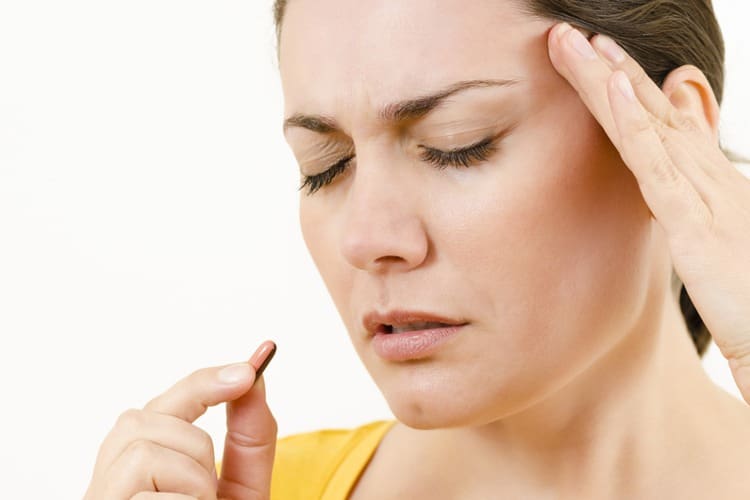A migraine is a type of headache that is usually severe and characterised by one-sided, throbbing pain. Migraines are often accompanied by nausea and vomiting and sensitivity to light and/or sound.
While migraines can be debilitating and have you out of action for a few hours or even a day or more, there are treatments available to help prevent and treat migraines.
Avoiding migraine triggers
Knowing what triggers migraines for you, and avoiding these triggers, can help you to manage your migraines. Keeping a symptom diary can be helpful for working out what things, if any, trigger your migraines.
Common migraine triggers include:
- stress;
- missing a meal;
- lack of sleep;
- certain odours;
- alcohol;
- certain foods including cured meats, chocolate, caffeine, nuts, pickled foods, monosodium glutamate (MSG), aged cheese, yogurt, onions, brown vinegar, chicken livers, among many others;
- hormone fluctuations (such as around menstruation in women);
- some medicines used to treat other conditions; and
- overuse of pain-relieving medicines.
Migraine medication
There are several medicines that can be taken to help relieve migraines. Your doctor can recommend the most suitable migraine medication for you.
To be most effective, medicines to treat a migraine are best taken as soon as migraine symptoms are noticed.
Pain relievers
Most over-the-counter headache medicines are only helpful for people who have mild or moderate, rather than severe, migraine pain.
Mild migraine pain may be helped by non-steroidal anti-inflammatory drugs (NSAIDs) such as ibuprofen or by aspirin. When taken right at the onset of symptoms, aspirin can relieve even severe migraines. Aspirin should not be given to children younger than 16 years.
Paracetamol may also help relieve migraine pain in some people.
Anti-nausea medicines
As nausea and vomiting are common with migraines, and may prevent absorption of oral migraine medicines, it is often recommended to take an anti-nausea medicine along with other migraine medicines. Anti-nausea medicines may also help relieve the pain of migraines.
Anti-nausea medicines available in Australia include domperidone (brand name Motilium), metoclopramide (e.g. Maxolon, Metomax), and prochlorperazine (e.g. Stemetil, Nausetil).
Triptans
No migraine medicine is effective for all people, and those who do not respond to over-the-counter pain relievers may need special migraine medicines called triptans prescribed by their doctor.
Examples of these medicines include:
- eletriptan (brand name Relpax);
- naratriptan (e.g. Naramig);
- rizatriptan (e.g. Maxalt);
- sumatriptan (e.g. Imigran, Iptam); and
- zolmitriptan (e.g. Zomig).
The above medicines are available as tablets as well as nasal sprays, wafers that dissolve on the tongue and self-injection devices, which are helpful if you have nausea and vomiting with your migraines and can’t keep tablets down.
Side effects associated with triptans may include warm sensations, dizziness and pins and needles. Triptans are not suitable for people with uncontrolled high blood pressure, coronary heart disease and blood vessel disease. It’s also important not to take triptans at the same time as certain other medicines, including some complementary medicines.
All migraine medications are best given at the first sign of a migraine.
Self-care for migraines
The following self-care measures can help when you have a migraine. These measures can be used in addition to medicines.
- Rest or sleep in a dark, quiet room.
- Try to stay still and avoid activities, including reading, watching television or using a screen.
- Apply a cold compress to your forehead or the back of your neck.
- Gently massage or apply gentle pressure to painful areas of your forehead and scalp.
Preventive medicines for migraine
People who have severe or frequent migraines (more than 2-3 times a month) may benefit from medicines that can help prevent migraines.
Medicines that can be used to prevent migraines include:
- amitriptyline;
- pizotifen (brand name Sandomigran);
- propranolol (e.g. Inderal, Deralin);
- sodium valproate;
- topiramate (e.g. Topamax, Epiramax, Tamate); and
- verapamil.
These medicines are more commonly associated with treatment of other conditions, such as depression, high blood pressure or seizures, but can also be effective in preventing migraines. This type of preventive medicine is usually taken every day.
Botulinum toxin type A (Botox) can be used to help prevent migraine headaches in certain people with chronic migraine (headaches on at least 15 days per month of which at least 8 days are with migraine). Botox is injected into specific head and neck muscle areas. Repeat injections may be needed after 12 weeks.
Women who tend to get migraines around the time of their periods may be able to take preventive medicines (such as NSAIDs or oestradiol gel – a hormonal treatment) for several days around the time of the expected migraine attack. Talk to your doctor about treatments for migraines that are triggered by fluctuations in hormones related to your menstrual cycle.
Medicines for the prevention of migraines are not suitable for everyone and can cause side effects.
Other treatments for preventing migraines
Other treatments that may be useful in preventing migraines include:
- cognitive behavioural therapy (a type of psychological therapy that has been shown to be as effective as medicines in preventing migraines);
- acupuncture;
- relaxation exercises; and
- stress management training.
Although these therapies may be useful on their own, they may be more effective when used together with preventive medicines for migraine.
Cutting down on your caffeine intake may also help prevent migraines.
Magnesium, the herb feverfew and high doses of vitamin B2 (riboflavin) may also help in the prevention of migraines. Always check with your doctor before starting any supplements or complementary medicines, especially if you are already taking other medicines.

